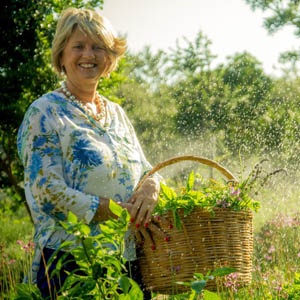Gail Davidson is the owner of Prana Lodge, a five-star luxury hotel on the Eastern Cape’s Wild Coast. She has a passion for gardening and picks fresh herbs to use in the lodge’s kitchen. We chatted to her about the art of growing herbs and the best way to use them in cooking.
1. When growing herbs, what is the number 1 rule?
Organic herb growing all starts with the soil. Building up a healthy, nutrient rich soil will result in your herbs being stronger and more disease resistant.
2. Do you preserve any of your herbs and is this advisable?
Many herbs dry very well and it is incredibly rewarding to use herbs you have grown and preserved. I dry lavender which we use in our guests’ rooms, bathrooms and outside areas and I collect the dried seeds to propagate the next crop of lavender.
Oregano, bay leaves and rosemary dry well and retain their flavour for cooking. Once they are dry you can store them in an airtight glass container, preferably dark, and they will last about 18 months.
3. What herb do you use the most when cooking?
One of my favourite herbs is basil. It grows very easily and I use it a lot when I cook with tomatoes and Italian dishes. I use it in both cooked and raw dishes – it’s a great addition to salads. I add it to cooked dishes right at the end of the cooking to enhance the flavour of the dish. It is a very versatile herb and can be used with a wide range of dishes.
4. What are its health benefits?
Basil has a wide range of medicinal properties, it is a very uplifting herb and is often used to treat depression and exhaustion and it helps improve concentration. It can also be used for the treatment of colds, sinus congestion, asthma and coughs.
It is also a good soother for the digestive system and is an antispasmodic and helps with nausea and vomiting. It is also believed to strengthen the immune system, kill parasites and can be used as a rub on sprains, swellings and insect bites.
5. What is your preferred herb for a flu-fighting home cure?
African Wormwood is known for it flu-fighting properties, the leaves are used as an infusion but should not be used during pregnancy. The leaves and flowers of basil, also used as an infusion, are an excellent for the treatment of colds and flu.
6. What kind of soil do herbs need?
The best soil to grow herbs in must have a high percentage of broken down organic matter, and must be well drained and fertile. Compost and manure, leaves and other organic mulch will improve the physical structure of the soil, aerating and moistening the soil which encourages the natural growth of beneficial bacteria and other organisms.
7. Are there any poisonous herbs that one should be aware of?
Yes there are many herbs that can be toxic for human consumption. Different parts of the herb can also be toxic – for example the leaves, the flowers, the berries or the roots, where one part is toxic and the other parts are not.
For example, in my herb garden I grow Rhubarb where the leaf blade is highly toxic if eaten in large quantities. I also grow Tansy for its insect-repelling benefits but it is highly toxic if eaten.
8. The best herb for a) chicken b) fish c) beef?
Chicken – Thyme
Fish – Dill, tarragon or fennel
Beef – Coriander, thyme or rosemary
9 What is your favorite herb and spice combination?
Thyme and coriander seeds – e.g. slow roasted pork shoulder

